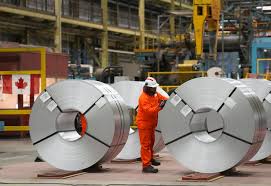U.S. President Donald Trump’s tariffs have resulted in the layoff of hundreds of Canadian workers, many of whom were employed in the steel and aluminum industries, according to a major union and businesses.
Economists cautioned that this was just the start, as the effects of tariffs are anticipated to spread over time.
Canada’s economy and labor market are feeling chilly due to the uncertainty surrounding Trump’s promises.
On March 12, Trump levied duties on steel and aluminum; on April 2, additional penalties may follow.
About 200 of the members of the United Steelworkers, the largest private-sector union in North America with over 225,000 members in Canada, have already lost their jobs, according to Marty Warren, national director of the organization.
One of the impacted businesses is Canada Metal Processing Group, which said in a press release on February 24 that it was laying off 140 workers, partly because of “the threat of incoming tariffs from the United States on steel and steel derivatives.” The tariffs that were threatened are now in effect.
Laptops 1000A company spokesperson told reporters that the company is reducing its workforce through a combination of retirements, work share, and permanent layoffs.
The company is also freezing hiring for new or vacant positions.
According to Warren, Ontario-based Algoma Steel has also laid off 27 people.
Algoma Steel CEO Michael Garcia told reporters that the company has laid off about 20 people and could lay off more if it cannot find new Canadian customers.
“Everyone losing a job or being laid off is a major hit,” he said, adding that he expects “a tidal wave” next week when a 30-day reprieve for goods compliant with the trilateral U.S.-Mexico-Canada free-trade agreement ends.
“With the full-blown tariffs coming in on April 2 … it’ll probably affect 100,000 of our members.”
Scott Noseworthy has been operating shredders at the Canada Metal Processing Group’s Ivaco factory in eastern Ontario for the last four years.
More than a month ago, workers received notification of a possible layoff, but it wasn’t until much later that they were confident it was happening. They wanted tariffs to be avoided.
“When Trump imposed the tariffs, it kind of hit us and brought us to a halt,” he stated.
The current strategy is to return to work this week but to perform maintenance and cleanup tasks. He’s not sure after that.
He claimed that having a two-year-old kid at home makes the uncertainty difficult.
He remarked, “It’s hectic: You don’t know whether you’re going to have work one week to the next.”
Warren is in favor of improved job insurance and skill development for laid-off employees.
GOVERNMENT ACTIONS
Prime Minister Mark Carney proposed policies on Friday that would provide people earlier access to employment insurance, just days before a federal election is scheduled.
The federal government of Canada launched this month a multibillion-dollar business-focused aid package and a work-sharing program that offers employment insurance benefits to workers who put in fewer hours.
More is required, according to proponents and some economists, including significant changes to employment insurance that would enable more people to get it for longer periods with a weekly minimum payout.
During a campaign, when Parliament is not in session, such reforms might be implemented as a trial project, according to economist Armine Yalnizyan, Atkinson Fellow on the Future of Workers. Legislation would be needed to make it the norm.
Steven MacKinnon, Carney’s Labour Minister, was unavailable for an interview.
“The Government of Canada will continue to monitor the impacts of tariffs across sectors and the economy and will bring forward additional measures to support workers and businesses as needed,” department spokesman Mila Roy wrote in an email before Friday’s announcement.
The Workers’ Action Center’s executive director, Deena Ladd, stated that her group was already receiving reports of employees being let go from smaller subcontractors and import-export businesses, particularly those connected to the steel and aluminum sectors.
“Things are changing every day. … That uncertainty we’ve seen many people talk about is no good for employers or businesses. You can imagine how much more difficult it is for workers.”

















